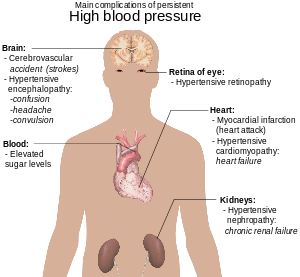Blood pressure (BP), sometimes referred to as arterial blood pressure, is the pressure exerted by circulating blood upon the walls of blood vessels, and is one of the principal vital signs. When used without further specification, "blood pressure" usually refers to the arterial pressure of the systemic circulation. During each heartbeat, blood pressure varies between a maximum (systolic) and a minimum (diastolic) pressure.The blood pressure in the circulation is principally due to the pumping action of the heart. Differences in mean blood pressure are responsible for blood flow from one location to another in the circulation. The rate of mean blood flow depends on the resistance to flow presented by the blood vessels. Mean blood pressure decreases as the circulating blood moves away from the heart through arteries and capillaries due to viscous losses of energy. Mean blood pressure drops over the whole circulation, although most of the fall occurs along the small arteries and arterioles. Gravity affects blood pressure via hydrostatic forces (e.g., during standing), and valves in veins, breathing, and pumping from contraction of skeletal muscles also influence blood pressure in veins.
Blood pressure without further specification usually refers to the systemic arterial pressure measured at a person's upper arm and is a measure of the pressure in the brachial artery, the major artery in the upper arm. A person’s blood pressure is usually expressed in terms of the systolic pressure over diastolic pressure and is measured in millimetres of mercury (mmHg), for example 120/80. It is also expressed as the amount over normal atmospheric pressure (760 mmHg), so a blood pressure of 120 mmHg would actually be 880 mmHg of true pressure.
Blood pressure varies in healthy people and animals, but its variation is under control by the nervous and endocrine systems. Blood pressure that is pathologically low is called hypotension, and that which is pathologically high is hypertension. Both have many causes and can range from mild to severe.







0 Comments:
Post a Comment